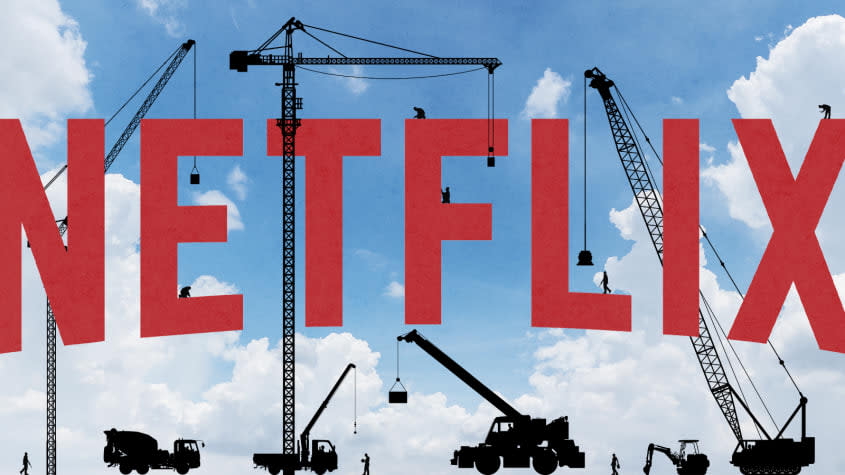Big changes are coming for Netflix. Here's what to expect.

Big changes may be coming to Netflix as the streamer's stock plunges. Why is this happening, and how might the average subscriber be affected? Here's everything you need to know:
What is password sharing, and is Netflix planning to end it?
Netflix's terms of service say a user's account "may not be shared with individuals beyond [their] household." But many subscribers do just that, and according to Netflix, the result is that more than 100 million households don't pay for the service. For perspective, Netflix says about 222 million households do pay.
The company didn't seem to care about this for years — and at times, even encouraged account sharing. "Love is sharing a password," Netflix even once declared on Twitter.
But this attitude may be coming to an end. Netflix chief product officer Greg Peters says the company is "not trying to shut down" account sharing completely, but it's looking for ways to make money off these viewers who aren't paying anything.
How is Netflix planning this crackdown?
In March 2022, Netflix said it was testing a way to crack down on password sharing in Chile, Costa Rica, and Peru. This would involve prompting subscribers to pay more per month to share their accounts.
In the test, Netflix users are able to add "sub accounts" for up to two people who don't live with them. Their subscription fee would go up, though the total would come out to less than if those two people both signed up for their own separate Netflix accounts. In Costa Rica, as an example, Netflix said adding sub accounts would cost an additional $2.99.
Alternatively, users who are watching on someone else's account could transfer their profile to a new account while keeping their viewing history, list, and recommendations. Right now, this is just a test, so it's unclear how similar it might look to what Netflix eventually brings to the United States.
Netflix has also tested a feature asking users to enter a verification code sent to the owner of an account to continue watching — something that could, for instance, affect those using the account of someone they aren't necessarily in regular contact with.
Why is Netflix doing this?
Netflix's stock plunged in April 2022 after it lost subscribers for the first time in over a decade — 200,000 of them. The company said this could partially be blamed on losses from suspending service in Russia amid the war in Ukraine. But the earnings report still stunned analysts, as Netflix had projected it would gain 2.5 million subscribers that quarter.
Seeking to quickly assure shareholders it was taking action to boost revenue, Netflix said it it was working on "more effective monetization of multi-household sharing." Co-CEO Reed Hastings told shareholders Netflix had been thinking about this for years, but "when we were growing fast, it wasn't the high priority to work on." Now that this has changed, it's become top of mind.
When might this happen?
Netflix hasn't announced when consumers might have to pay to share their account, though subscribers probably don't have to worry about it in the very immediate future. Peters says "it will take a while" to work out the details and that "we're going to go through a year or so of iterating."
Is Netflix getting ads, too?
It may be, though they'd be purely optional. In another bid to combat subscriber losses, the streamer is exploring the idea of launching ad-supported subscription tiers, allowing users to pay less per month in exchange for watching ads. This is another big reversal for Netflix, which for years declined to bring advertising to its service.
But Hastings now says that "allowing consumers who would like to have a lower price, and are advertising tolerant, get what they want makes a lot of sense." There's no firm date on when this could happen, but Netflix says it will explore it "over the next year or two."
It also isn't clear what the ad-supported tier might cost, but Hulu follows a similar model, offering U.S. subscribers the option of paying $6.99 a month with advertising or $12.99 without advertising. Analysts still have many questions about how this will work with Netflix, though, especially considering the streamer's original programming typically doesn't have breaks for commercials.
Why is Netflix struggling right now?
The days of Netflix being one of the only big streaming services in town are long gone. In the past few years, the marketplace has exploded with an overabundance of streaming options like Disney+ and HBO Max, and it seems the competition is finally catching up with Netflix.
This could soon affect the content Netflix offers if it has to reduce the kind of extravagant spending it's known for. At The Ankler, Richard Rushfield wrote that one of Netflix's problems is it's a "business of 200 million subscribers" that's been "spending like a business of one billion subscribers," while The Hollywood Reporter points to concern about Netflix's "lack of curation and quality control" for its huge slate of original content. But The Wall Street Journal reports Netflix has already started "imposing more financial discipline" and plans to "add fewer new titles, with a greater emphasis on quality."
Netflix remains the most dominant streaming service with far more subscribers than Disney+ or HBO Max. But the company expects its troubles to continue, forecasting it will lose another two million subscribers in the second quarter of 2022. Netflix's terrible week came just as it was announced that the brand new service CNN+ would shut down after just one month. Back to back, both stories created the perception of trouble in the streaming business, furthering the narrative that the existence of so many different services for consumers to choose from might be unsustainable.

